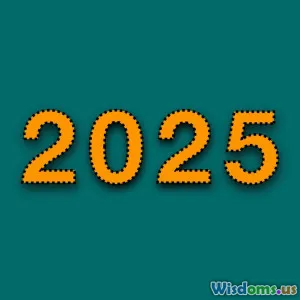
Five Skills Development Trends You Should Know in 2024
12 min read Explore the top five skills development trends shaping careers and workplaces in 2024. (0 Reviews)
Five Skills Development Trends You Should Know in 2024
The skills landscape is changing at breakneck speed, reshaping careers, learning journeys, and workplace expectations worldwide. As 2024 unfolds, effective skills development has become more than an advantage—it's a necessity for organizations and individuals alike. But what stands out amid new technologies, societal shifts, and evolving industry norms? These five key trends represent the vanguard of modern upskilling and reskilling. Prepare to be inspired, challenged, and equipped for your next step in professional growth.
Personalized Learning Experiences Powered by AI

In 2024, artificial intelligence continues to revolutionize how we learn and develop new skills. AI-driven tutorials, assessments, and content recommendation systems are transforming generic courses into deeply personalized experiences. Platforms like Coursera, Udemy, and LinkedIn Learning are embracing AI algorithms that analyze individual learning patterns, skill gaps, and even attention spans. These systems assemble custom-tailored modules, pacing, and feedback loops that align with each learner's needs.
For example, imagine an HR manager eager to master advanced data analysis. Instead of browsing generic statistics modules, she encounters a learning path where real-time performance triggers new material, adaptive quizzes, and instant micro-feedback when she struggles. As she shows proficiency, the system increases lesson complexity or suggests collaborative projects with more skilled peers.
Key Insights:
- Personalization reduces training time and information overload, focusing energy on skills with the highest payoff.
- Stats show learners who experience customized pathways are 40% more likely to finish online courses (according to a 2023 LinkedIn Learning Report).
- Companies can deploy AI to address critical gaps faster, e.g., banks advancing cyber security awareness with targeted simulations rather than boilerplate modules.
Action Tip: Seek out learning providers or in-house programs that utilize AI-based diagnostics and adaptive content. For organizations, invest in platforms that track employee progress and recommend targeted upskilling paths automatically.
Soft Skills and Human-Centric Competencies Take Center Stage

With automation and digitization handling repetitive cognitive tasks, human-centric skills—often called soft skills—have never been more sought after. Critical thinking, empathy, adaptability, and sophisticated communication remain pivotal even in roles dominated by technology.
Global surveys by McKinsey and Deloitte in late 2023 confirmed a dramatic increase in employers prioritizing emotional intelligence, collaboration, and creative problem-solving. 89% of HR professionals rated these skills as equally or more important than technical prowess when filling roles, especially in management, service, and client-facing careers.
Concrete Example: A 2024 case study from Siemens reports that multi-disciplinary teams with formal empathy and negotiation training saw project completion rates rise by 27%, along with higher customer satisfaction scores—a clear ROI for human skills development.
How to Build These Skills:
- Leverage blended learning: Mix digital modules with peer discussion, role-playing, or real-world simulations for practical social learning.
- Encourage peer mentorship. Cross-generational and cross-functional relationships enrich soft skills through exposure to varying perspectives.
- Integrate structured reflection exercises in training plans to reinforce learning—from journaling after a tough conversation to video-reviewing your presentation style.
Microlearning: Bite-Sized, On-Demand Skill Acquisition

Modern professionals face intense time pressures, managing many priorities on the go. Microlearning—short, focused learning bursts—has become a dominant method for upskilling efficiently in 2024. Spanning three to ten minutes per module, these "snackable" lessons fit lunch breaks, commutes, or quick workday pauses.
Consider the success of Duolingo, which has seen record engagement for micro lessons in business English and communication. At SAP, internal training transitioned from hour-long webinars to mobile-optimized, five-minute micro modules, yielding a 55% uptick in course completions and noticeable application speed by learners.
Analytical Benefits:
- Microlearning increases retention rates by 20% due to better engagement and spaced repetition techniques.
- Enables blended approaches, serving as standalone upskilling or just-in-time learning during critical projects.
- Grows essential "learning in the flow of work" habits, now championed by top organizations from Microsoft to Unilever.
How To Leverage This Trend:
- Break down bigger learning initiatives into smaller, practical modules with clear, actionable outcomes.
- Use microlearning platforms—like Axonify or EdApp—designed for rapid uptake and mobile learning.
- Encourage teams to co-create micro lessons or job aids from real workplace challenges, building community-driven knowledge.
Skills-Based Hiring Overtakes Traditional Degrees

The dominance of college degrees and formal credentials is fading. In 2024, skills-based hiring is taking precedence, unlocking opportunities for candidates with nontraditional backgrounds. Companies like IBM, Google, and Accenture explicitly state that relevant skills—demonstrated via portfolios, coding tests, or industry certifications—can outweigh a university diploma.
According to the World Economic Forum, 43% of employers plan to eliminate degree requirements for certain positions this year. This not only widens their talent pools but fuels diversity, innovation, and productivity by surfacing candidates with practical, self-taught, or alternative learning pathways.
Real-World Application: Leading logistics firm Maersk launched a "skills-first" hiring program in 2023. Roles in IT, operations, and customer support now require candidates to demonstrate skills through live case simulations or micro-certifications. The approach doubled the number of qualified candidates from underrepresented groups and reduced hiring costs by 35% within the first six months.
Comparison Table: Traditional vs. Skills-Based Hiring
| Criteria | Degree-Based Hiring | Skills-Based Hiring |
|---|---|---|
| Barrier to Entry | High | Low/moderate |
| Evaluation Methods | Resume screening | Assessments/projects |
| Talent Diversity | Limited | Broader, more inclusive |
| Speed of Process | Slower | Faster |
Practical Advice:
- Jobseekers: Focus on skills portfolios, GitHub, digital badges, or credentials from recognized industry sources (e.g., AWS, Google, PMI).
- Employers: Redesign job postings to specify skills required and build fair, direct assessments into the recruitment pipeline.
Continuous, Self-Directed Learning Becomes the Norm

The "job for life" era is history. Today, professionals are embracing continual, self-driven development, updating competencies not just periodically—but constantly. Harvard Business Review studies show top performers dedicate over 10% of working hours to structured learning activities per week, whether via MOOCs, podcasts, webinars, or collaborative hacking projects.
Gone are the days when annual reviews spurred brief, compliance-driven upskilling. The pace of change, coupled with the rise of remote and hybrid work models, means it is up to each professional to set learning goals and proactively seek ways to close skills gaps. Organizations, in turn, are building cultures of "always-on" learning—rewarding self-motivation with stretch assignments, internal mobility, and recognition programs.
Insightful Examples:
- Adobe's "Learning Fund" allows employees to expense any relevant online course, regardless of topic or platform, provided they share key insights with peers.
- Investment group BlackRock created internal skill academies, where self-selection into new arenas (e.g., ESG investing or data visualization) leads to both certification and fast-tracked project assignments.
Action Steps for Lifelong Learners:
- Schedule dedicated "learning blocks" on your calendar, just as you would for important meetings.
- Share your insights and learning wins openly—peer reinforcement enhances motivation and cements knowledge through teaching.
- Regularly audit your skills inventory, aiming to recalibrate quarterly in line with both changing market trends and career ambitions.
Thriving in the Skills Revolution
Adapting to these trends isn't just about career survival; it's about unlocking higher engagement, marketable expertise, enhanced innovation, and meaningful impact. Whether you’re leading a learning transformation, navigating the future of work, or charting your own growth, keeping pace with these five skills development trends will set you apart in 2024 and beyond. Now is the moment to embrace smart personalization, champion soft skills, explore bite-sized learning, advocate skills-based hiring, and build lifelong, self-driven learning habits. The future belongs to those who never stop evolving.
Rate the Post
User Reviews
Other posts in Personal Growth & Development
Popular Posts















